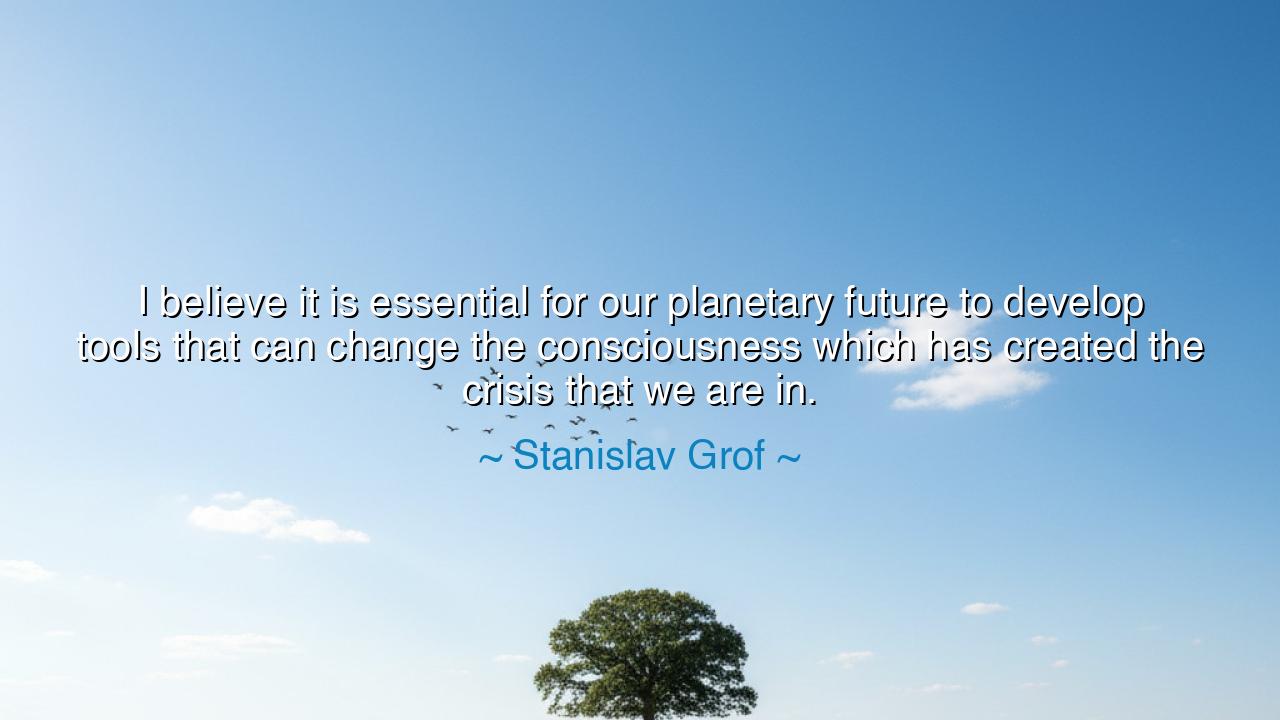
I believe it is essential for our planetary future to develop
I believe it is essential for our planetary future to develop tools that can change the consciousness which has created the crisis that we are in.






The visionary Stanislav Grof once declared: “I believe it is essential for our planetary future to develop tools that can change the consciousness which has created the crisis that we are in.” These words resound not merely as a plea for progress, but as a profound invocation for awakening. For Grof, the healer of minds and explorer of inner realms, understood that the sickness of our world does not begin in the soil, nor in the seas, nor in the air — it begins in the human spirit. The outer world reflects the inner one; the turmoil of nations mirrors the storms within the heart. If humanity is to survive and thrive, it must transform the very state of mind from which its actions flow.
In this statement lies a truth that the ancients knew well — that the consciousness of humankind shapes the destiny of the Earth. When our vision is clouded by greed, we exploit; when it is blinded by fear, we destroy. Yet when consciousness expands — when it remembers its unity with all life — compassion blossoms, and harmony returns. The philosopher’s stone that can heal the world, then, is not a mineral, nor a machine, but a change of perception — a shift in awareness from separation to interconnection, from domination to stewardship, from ignorance to wisdom.
The origin of Grof’s insight comes from his lifelong exploration of the human psyche. As a pioneer of transpersonal psychology, he ventured beyond the boundaries of the ordinary mind, seeking ways to understand the deeper dimensions of existence. He saw that humanity’s crises — ecological, social, spiritual — all stem from the same root: a limited consciousness, disconnected from the sacredness of life. Like a man who mistakes his reflection for himself, humanity has forgotten that it is part of a greater whole — that the rivers, forests, and skies are not resources, but kin. Thus, Grof’s words are not only a call for psychological healing but for planetary renewal.
History, too, bears witness to the power of conscious transformation. In the time of Ashoka, the great emperor of India, conquest and bloodshed once ruled his heart. But after witnessing the suffering his wars caused, his consciousness shifted — from cruelty to compassion, from power to peace. He renounced violence and devoted his reign to the welfare of all living beings. His transformation was not just personal; it changed the fate of an empire. What Grof urges us to recognize is that such transformation is needed now — not for one man, but for the whole of humanity.
The crisis of our age — the burning forests, the melting ice, the divided nations — is not merely ecological or political. It is spiritual. It is a reflection of the human heart, fractured by illusion. Our technologies have grown vast, yet our wisdom has lagged behind. We have reached for the stars without understanding the soil beneath our feet. To heal this, Grof calls for tools — not weapons, not machines of profit, but instruments of awakening: practices of mindfulness, self-reflection, art, and science united in the service of consciousness.
Yet he does not speak of escapism or mysticism detached from reality. The change of consciousness he envisions is active, practical, and world-embracing. It is the awakening that moves the hand to plant a tree, the heart to forgive, the scientist to innovate ethically, and the leader to serve rather than dominate. It is the rebirth of awe — the rediscovery that to harm the Earth is to harm ourselves. Such a shift is not easy; it demands courage, humility, and the willingness to face the shadows within us as much as the shadows in the world.
The lesson, then, is both ancient and urgent: the outer world cannot heal until the inner one awakens. Each of us must become an alchemist of spirit, transforming fear into love, apathy into action, confusion into clarity. The tools we must develop — education that teaches empathy, technologies guided by conscience, and communities rooted in cooperation — are the sacred instruments of a new age. Through them, humanity may remember its rightful place as a guardian, not a conqueror, of creation.
So let Grof’s words echo through the halls of our time: to save the planet, we must first awaken the soul. The future of the Earth depends not on the strength of our inventions, but on the depth of our understanding. Change the consciousness that created the crisis, and the crisis will dissolve like mist before the morning sun. Therefore, live each day as a seed of renewal — think with wisdom, act with love, and remember always that the destiny of the world rests in the mind of humankind.






AAdministratorAdministrator
Welcome, honored guests. Please leave a comment, we will respond soon